Nabucco
| Nabucco | |
|---|---|
| Opera by Giuseppe Verdi | |
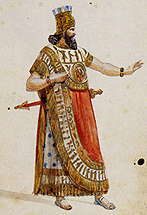 Costume sketch for Nabucco for the original production | |
| Librettist | Temistocle Solera |
| Language | Italian |
| Based on | Play by Auguste Anicet-Bourgeois and Francis Cornue, as well as Antonio Cortese's ballet adaptation |
| Premiere | 9 March 1842 Teatro alla Scala, Milan |
Nabucco (Italian pronunciation: [naˈbukko]; short for Nabucodonosor [naˌbukoˈdɔːnozor]~[naˌbukodonoˈzɔr], English Nebuchadnezzar) is an Italian-language opera in four acts composed in 1841 by Giuseppe Verdi to an Italian libretto by Temistocle Solera. The libretto is based on biblical books of Jeremiah and Daniel and the 1836 play by Auguste Anicet-Bourgeois and Francis Cornue, although Antonio Cortese's ballet adaptation of the play (with its necessary simplifications), given at La Scala in 1836, was a more important source for Solera than the play itself.[1] Under its original name of Nabucodonosor, the opera was first performed at La Scala in Milan on 9 March 1842.
Nabucco is the opera which is considered to have permanently established Verdi's reputation as a composer. He commented that "this is the opera with which my artistic career really begins. And though I had many difficulties to fight against, it is certain that Nabucco was born under a lucky star".[2]
It follows the plight of the Jews as they are assaulted, conquered and subsequently exiled from their homeland by the Babylonian King Nabucco (in English, Nebuchadnezzar II). The historical events are used as background for a romantic and political plot. The best-known number from the opera is the "Chorus of the Hebrew Slaves", Va, pensiero, sull'ali dorate / "Fly, thought, on golden wings", a chorus which is regularly given an encore in many opera houses when performed today.
Composition history
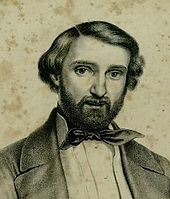
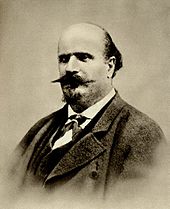
The success of Verdi's first opera, Oberto, resulted in Bartolomeo Merelli, La Scala's impresario, offering Verdi a contract for three more works. After the failure of his second opera Un giorno di regno (completed in 1840 towards the end of a brutal 2-year period during which both of his infant children and then his 26-year-old wife died), Verdi vowed never to compose again.
In "An Autobiographical Sketch", written in 1879, Verdi tells the story of how he came to be twice persuaded by Merelli to change his mind and to write the opera.[2] The distance of 38 years from the event may have led to a somewhat romanticized view; or, as Verdi scholar Julian Budden puts it: "he was concerned to weave a protective legend about himself [since] it was all part of his fierce independence of spirit."[3] However, in Volere è potere ("Where there's a will ...")—written ten years closer to the event—Michele Lessona provides a very different account of the events, as allegedly recounted by Verdi himself.[4]
After a chance meeting with Merelli close to La Scala, the impresario gave him a copy of Temistocle Solera's libretto which had been rejected by the composer Otto Nicolai.[2] Verdi describes how he took it home, and threw "it on the table with an almost violent gesture. ... In falling, it had opened of itself; without my realising it, my eyes clung to the open page and to one special line: 'Va pensiero, sull' ali dorate' "[5]
While it has been noted that "Verdi read it enthusiastically"[6] (and certainly he states that, while he attempted to sleep, he was kept awake and read and re-read the libretto three times), others have stated that he read the libretto very reluctantly[7] or, as recounted by Lessona, that he "threw the libretto in a corner without looking at it anymore, and for the next five months he carried on with his reading of bad novels ... [when] towards the end of May he found himself with that blessed play in his hands: he read the last scene over again, the one with the death of Abigaille (which was later cut), seated himself almost mechanically at the piano ... and set the scene to music."[4][6]
Nevertheless, Verdi still refused to compose the music, taking the manuscript back to the impresario the next day. But Merelli would accept no refusal and he immediately stuffed the papers back into Verdi's pocket and "not only threw me out of his office, but slammed the door in my face and locked himself in".[5] Verdi claims that gradually he worked on the music: "This verse today, tomorrow that, here a note, there a whole phrase, and little by little the opera was written"[5] so that by the autumn of 1841 it was complete. At the very least, both Verdi's and Lessona's versions end with a complete score.
Performance history
19th century
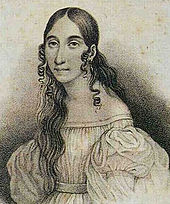
The opening performances, limited to only eight because the season was coming to an end, were "a colossal success."[6] But, when the new season opened on 13 August 1842, about an additional 60 performances had been added by the end of that year.
Numerous Italian and foreign theatres put on this opera in the years immediately following, including La Fenice in Venice in December 1842. In 1843 Donizetti conducted it in Vienna, and other stagings took place that year in Lisbon and Cagliari. But the definitive name of Nabucco for the opera (and its protagonist) was first used at a performance at the San Giacomo Theatre of Corfu in September, 1844.[6] Nonetheless, a more plausible alternative for the establishment of this abbreviated form claims that it was the result of a revival of the opera in Teatro del Giglio of Lucca.[8]
The opera was first given in London at Her Majesty's Theatre on 3 March 1846 under the name of Nino, since the depiction of biblical characters on stage "was not considered proper".[9][10] In the US it appeared at the Astor Opera House in New York on 4 April 1848.[7]
20th century and beyond

Although not as frequently performed as some of Verdi's other operas, Nabucco is still frequently heard around the world today. It has been on the Metropolitan Opera's roster since it was first presented there during the 1960/61 season. It is the only early Verdi opera, apart from Ernani and Luisa Miller, which has received regular performances at the Met in recent times, having been presented in 2001, 2003, 2004, 2005, 2011 and 2016.[11]
Nabucco is also regularly performed at the Arena di Verona, where it was presented in 2002, 2003, 2005, 2007, 2008 and 2011.[12] Amongst the performances preserved on DVD are those at the Arena di Verona (1981 and 2007); La Scala (1987), Opera Australia (1996), Vienna State Opera (2001), Metropolitan Opera (2002), Genoa's Teatro Carlo Felice (2004), Teatro Municipale di Piacenza (2004), and Austria's St. Margarethen Opera Festival (2007).[13]
Many other companies have also performed it, including San Francisco Opera in 1982, Sarasota Opera in 1995, London's Royal Opera House in 1996, Lyric Opera of Chicago in 1997 and 2016,[14] the New National Theatre Tokyo in 1998, Teatro Colón in 2000, Baltimore Opera in 2006, and the Teatro Regio di Parma in 2008 as part of their on-going "Festival Verdi".[15] Nabucco was presented by the Michigan Opera Theatre and the San Diego Opera as part of their 2009–2010 seasons. The Israeli Opera celebrated its 25th anniversary in 2010 with Nabucco at Masada. It was performed at the Royal Opera House, Covent Garden in 1972 with Colin Davis[16] and March 2013 in a new co-production with La Scala, directed by Daniele Abbado,[17] which was relayed to cinemas and subsequently released on DVD. Seattle Opera produced its first-ever staging of Nabucco in August 2015.[18]
Roles
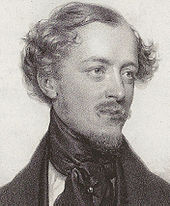
| Role | Voice type | Premiere cast, 9 March 1842 (Conductor: Eugenio Cavallini) |
|---|---|---|
| Nabucco, King of Babylon | baritone | Giorgio Ronconi |
| Abigaille, supposedly his elder daughter | soprano | Giuseppina Strepponi |
| Fenena, his daughter | mezzo-soprano | Giovannina Bellinzaghi |
| Ismaele, nephew of the King of Jerusalem | tenor | Corrado Miraglia |
| Zaccaria, high priest of the Jews | bass | Prosper Dérivis |
| Anna, Zaccaria's sister | soprano | Teresa Ruggeri |
| Abdallo, Babylonian soldier | tenor | Napoleone Marconi |
| High priest of Bel[19] | bass | Gaetano Rossi |
| People, soldiers | ||
Synopsis
Act 1: Jerusalem
- 'Thus saith the Lord, Behold, I shall deliver this city into the hand of the King of Babylon, and he will burn it with fire' (Jeremiah 21:10)
Interior of the Temple of Solomon
The Israelites pray as the Babylonian army advances on their city (Gli arredi festivi giù cadano infranti / "Throw down and destroy all festive decorations"). The High Priest Zaccaria tells the people not to despair but to trust in God (D'Egitto là su i lidi / "On the shores of Egypt He saved the life of Moses"). The presence of a hostage, Fenena, younger daughter of Nabucco, King of Babylon, may yet secure peace (Come notte a sol fulgente / "Like darkness before the sun"). Zaccaria entrusts Fenena to Ismaele, nephew of the King of Jerusalem and a former envoy to Babylon. Left alone, Fenena and Ismaele recall how they fell in love when Ismaele was held prisoner by the Babylonians, and how Fenena helped him to escape to Israel. Nabucco's supposed elder daughter, Abigaille, enters the temple with Babylonian soldiers in disguise. She, too, loves Ismaele. Discovering the lovers, she threatens Ismaele: if he does not give up Fenena, Abigaille will accuse her of treason. If Ismaele returns Abigaille's love, however, Abigaille will petition Nabucco on the Israelites' behalf. Ismaele tells Abigaille that he cannot love her and she vows revenge. Nabucco enters with his warriors (Viva Nabucco / "Long live Nabucco"). Zaccaria defies him, threatening to kill Fenena if Nabucco attacks the temple. Ismaele intervenes to save Fenena, which removes any impediment from Nabucco destroying the temple. He orders this, while Zaccaria and the Israelites curse Ismaele as a traitor.
Act 2: The Impious One
- 'Behold, the whirlwind of the Lord goeth forth, it shall fall upon the head of the wicked' (Jeremiah 30:23)
Scene 1: Royal apartments in Babylon
Nabucco has appointed Fenena regent and guardian of the Israelite prisoners, while he continues the battle against the Israelites. Abigaille has discovered a document that proves she is not Nabucco's real daughter, but the daughter of slaves. She reflects bitterly on Nabucco's refusal to allow her to play a role in the war with the Israelites and recalls past happiness (Anch'io dischiuso un giorno / "I too once opened my heart to happiness"). The High Priest of Bel informs Abigaille that Fenena has released the Israelite captives. He plans for Abigaille to become ruler of Babylon, and with this intention has spread the rumour that Nabucco has died in battle. Abigaille determines to seize the throne (Salgo già del trono aurato / "I already ascend the [bloodstained] seat of the golden throne").
Scene 2: A room in the palace
Zaccaria reads over the Tablets of Law (Vieni, o Levita / "Come, oh Levite! [Bring me the tables of the law]"), then goes to summon Fenena. A group of Levites accuse Ismaele of treachery. Zaccaria returns with Fenena and his sister Anna. Anna tells the Levites that Fenena has converted to Judaism, and urges them to forgive Ismaele. Abdallo, a soldier, announces the death of Nabucco and warns of the rebellion instigated by Abigaille. Abigaille enters with the High Priest of Bel and demands the crown from Fenena. Unexpectedly, Nabucco himself enters; pushing through the crowd, he seizes the crown and declares himself not only king of the Babylonians but also their god. The high priest Zaccaria curses him and warns of divine vengeance; an incensed Nabucco in turn orders the death of the Israelites. Fenena reveals to him that she has embraced the Jewish religion and will share the Israelites' fate. Nabucco is furious and repeats his conviction that he is now divine (Non son più re, son dio / "I am no longer King! I am God!"). There is a crash of thunder and Nabucco promptly loses his senses. The crown falls from his head and is picked up by Abigaille, who pronounces herself ruler of the Babylonians.
Act 3: The Prophecy
- 'Therefore the wild beasts of the desert with the wild beasts of the islands shall dwell there, and the owls shall dwell therein'. (Jeremiah 50:39)
Scene 1: The Hanging Gardens of Babylon
Abigaille is now Queen of Babylon. The High Priest of Bel presents her with the death warrant for the Israelites, as well as for Fenena. Nabucco, still insane, tries to reclaim the throne without success. Though his consent to the death warrant is no longer necessary, Abigaille tricks him into signing it. When Nabucco learns that he has consigned his (true) daughter to death, he is overcome with grief and anger. He tells Abigaille that he is not in fact her father and searches for the document evidencing her true origins as a slave. Abigaille mocks him, produces the document and tears it up. Realizing his powerlessness, Nabucco pleads for Fenena's life (Oh di qual onta aggravasi questo mio crin canuto / "Oh, what shame must my old head suffer"). Abigaille is unmoved and orders Nabucco to leave her.
Scene 2: The banks of the River Euphrates
The Israelites long for their homeland (Va, pensiero, sull'ali dorate / "Fly, thought, on golden wings; [Fly and settle on the slopes and hills]"). The high priest Zaccaria once again exhorts them to have faith: God will destroy Babylon. The Israelites are inspired by his words.
Act 4: The Broken Idol
- 'Bel is confounded, Merodach is broken pieces; her idols are confounded, her images are broken in pieces.' (Jeremiah 50:2)
Scene 1: The royal apartments, Babylon
Nabucco awakens, still confused and raving. He sees Fenena in chains being taken to her death. In despair, he prays to the God of the Hebrews. He asks for forgiveness, and promises to rebuild the temple in Jerusalem and convert to Judaism if his prayers are answered (Dio di Giuda / "God of Judah! [The altar, your sacred Temple, shall rise again]"). Miraculously, his strength and reason are immediately restored. Abdallo and loyal soldiers enter to release him. Nabucco resolves to rescue Fenena and the Israelites as well as to punish the traitors.
Scene 2: The Hanging Gardens of Babylon
Fenena and the Israelite prisoners are led in to be sacrificed (Va! La palma del martirio / "Go, win the palm of martyrdom"). Fenena serenely prepares for death. Nabucco rushes in with Abdallo and other soldiers. He declares that he will rebuild the Temple of Jerusalem and worship the God of the Israelites, ordering the destruction of the idol of Bel. At his word, the idol falls to the ground of its own accord and shatters into pieces. Nabucco tells the Israelites that they are now free and all join in praise of Jehovah. Zaccaria proclaims Nabucco the servant of God and king of kings. Abigaille enters, supported by soldiers. She has poisoned herself. She begs forgiveness of Fenena, prays for God's mercy and dies.
Historicity
The historical Nebuchadnezzar II (c. 634–562 BC) took Jerusalem in 597 BC, but the madness plot of the opera differs from both archeological and biblical records of him. In the Book of Daniel, his madness lasts for seven years before his conversion to Judaism. But in the opera it only lasts for the time between the order to kill the Fenena and the Jews, and it being carried out. The biblical story of seven year madness followed by conversion bears more similarity to the Dead Sea Scrolls' story of Nabonidus (556–539 BC), father of Belshazzar in the Cylinders of Nabonidus, than to the historical Nebuchadnezzar. Nabonidus was five kings later than Nebuchadnezzar, the last king of Babylon, and Belshazzar was a temporary regent during Nabonidus' reign. Historical and biblical records agree that the Jews were freed and their temple was rebuilt not by the Babylonians but by Cyrus the Great following his conquest of Babylon in 539 BC. The opera's Nabucco character is thus a composite of historical and biblical Nebuchadnezzar II, Nabonidus and Cyrus.
Babylonians addressed their own god as "Bel" (Italian: Belo), but the proper name of the deity is Marduk, who assumed the title of "lord" after his exaltation. The title "Bel" was in fact used also in connection with Nergal.
Anachronisms in the opera include the use and tearing of paper documents. In this period such documents would probably have been written on clay tablets in cuneiform.
Critical reaction
The opera was an instant success, dominating Donizetti's and Giovanni Pacini's operas playing nearby. While the public went mad with enthusiasm, the critics tempered their approval of the opera.
One critic who found Nabucco revolting was Otto Nicolai, the composer to whom the libretto was first offered. A Prussian, Nicolai felt at odds with emotional Italian opera while he lived near Milan. After refusing to accept the libretto proposal from Merelli, Nicolai began work on another offer called Il Proscritto. Its disastrous premiere in March 1841 forced Nicolai to cancel his contract with Merelli and return to Vienna. From there he learned of the success of Nabucco and was enraged. "Verdi's operas are really horrible," he wrote. "He scores like a fool – technically he is not even professional – and he must have the heart of a donkey and in my view he is a pitiful, despicable composer ... Nabucco is nothing but "rage, invective, bloodshed and murder.""[21]
However, Nicolai's opinions were in the minority and, today, he has become comparatively obscure. Nabucco secured Verdi's success until his retirement from the theatre, twenty-nine operas (including some revised and updated versions) later.
Music historians have long perpetuated a powerful myth about the famous "Va, pensiero" chorus sung in the third act by the Hebrew slaves. Scholars have long believed the audience, responding with nationalistic fervor to the slaves' powerful hymn of longing for their homeland, demanded an encore of the piece. As encores were expressly forbidden by the Austrian authorities ruling northern Italy at the time to prevent public protests,[22] such a gesture would have been extremely significant. However, recent scholarship puts this and the corresponding myth of "Va, pensiero" as the national anthem of the Risorgimento to rest. Although the audience did indeed demand an encore, it was not for "Va, pensiero" but rather for the hymn "Immenso Jehova," sung by the Hebrew slaves to thank God for saving His people. In light of these new revelations, Verdi's position as the musical figurehead of the Risorgimento has been correspondingly revised.[23][24] At Verdi's funeral, the crowds in the streets spontaneously broke into "Va, pensiero".[25]
Orchestration
Nabucco is scored for two flutes (one doubling as piccolo), two oboes (one doubling as English horn), two clarinets, two bassoons, four horns, two trumpets, three trombones (two tenor, one bass), one cimbasso, timpani, bass drum, cymbals, side drum, triangle, two harps, strings, and an onstage band.
Recordings
| Year | Cast (Nabucco, Abigaille, Zaccaria, Ismaele, Fenena) |
Conductor, Opera house and orchestra |
Label[26] |
|---|---|---|---|
| 1951 | Paolo Silveri, Caterina Mancini, Antonio Cassinelli, Mario Binci, Gabriella Gatti |
Fernando Previtali, Orchestra Sinfonica e Coro di Roma della RAI |
CD: Warner Fonit 8573 82646-2 |
| 1965 | Tito Gobbi, Elena Souliotis, Carlo Cava, Bruno Prevedi, Dora Caral |
Lamberto Gardelli, Vienna State Opera Orchestra and Chorus |
CD: Decca Cat: 417 407-2 |
| 1977–78 | Matteo Manuguerra, Renata Scotto, Nicolai Ghiaurov, Veriano Luchetti, Elena Obraztsova |
Riccardo Muti, Philharmonia Orchestra and the Ambrosian Opera Chorus |
CD: EMI Records Cat: 747 488-2 |
| 1982 | Piero Cappuccilli, Ghena Dimitrova, Yevgeny Nesterenko, Plácido Domingo, Lucia Valentini Terrani |
Giuseppe Sinopoli, Deutsche Oper Berlin |
CD: DG Cat: DG 410 512-2 |
| 1987 | Renato Bruson, Ghena Dimitrova, Paata Burchuladze, Bruno Beccaria, Raquel Pierotti |
Riccardo Muti, La Scala Orchestra and Chorus |
DVD: Warner Cat: 5050467-0944-2-0 |
| 2002 | Juan Pons, Maria Guleghina, Samuel Ramey, Gwyn Hughes Jones, Wendy White |
James Levine, Metropolitan Opera |
DVD: DG, live recording Cat: B0006O9M6S |
| 2004 | Alberto Gazzale, Susan Neves, Orlin Anastassov, Yasuharu Nakajiima, Annamaria Popescu |
Riccardo Frizza, Teatro Carlo Felice Orchestra and Chorus |
DVD: Dynamic, live recording Cat: 33465 |
| 2004 | Renato Bruson, Maurizio Frusoni, Lauren Flanigan, Carlo Colombara, Monica Bacelli |
Paolo Carignani, Teatro San Carlo Naples Orchestra and Chorus |
DVD: Brilliant Classics, live recording Cat: 92270 |
| 2007 | Leo Nucci, Maria Guleghina, Carlo Colombara, Fabio Sartori, Nino Surguladze, |
Daniel Oren, Arena di Verona Orchestra and Chorus |
DVD: Decca, live recording Cat: DDD 0440 074 3245 7 DH |
| 2009 | Leo Nucci, Dimitra Theodossiou, Riccardo Zanellato, Bruno Ribeiro, Annamaria Chiuri |
Michele Mariotti, Teatro Regio di Parma |
DVD:C Major,live recording Cat:720408 |
References
Notes
- ^ Budden, 1973, p. 95
- ^ a b c Verdi, "An Autobiographical Sketch" 1879 in Werfel and Stefan 1973, pp. 87–92. See also George Martin 1983 "Autobiographic Sketch and Nabucco" pp. 81–85
- ^ Budden 1973, p. 92
- ^ a b Lessona, pp. 297–98, in Budden 1973, p. 92
- ^ a b c Verdi in Werfel and Stefan 1973, pp. 88–90
- ^ a b c d "Nabucodonosor: History" on giuseppeverdi.it, in English. Retrieved 1 April 2013
- ^ a b David Kimbell, in Holden, pp. 978–79
- ^ Budden 1985, Verdi, p. 20
- ^ Budden 1973, p. 112.
- ^ "Her Majesty's Theatre", The Times, 4 March 1846, p. 5
- ^ Metropolitan Opera,Repertory Statistics
- ^ Arena di Verona, Performance Archives
- ^ Royal Opera House DVD Catalog
- ^ Von Rhein, John (22 September 1997). "Striking Opening For Lyric". Chicago Tribune
- ^ Parma's 2008 "Festival Verdi"
- ^ http://www.rohcollections.org.uk/performance.aspx?performance=11810&row=18&searchtype=performance&page=6&person=Colin
- ^ Church, Michael (1 April 2013)."Review: Nabucco, Royal Opera House, London". The Independent. Retrieved 1 April 2013.
- ^ Melinda Bargreen (2015-08-10). "Seattle Opera's 'Nabucco': An old story, told in a new way". Seattle Times. Retrieved 2016-05-08.
- ^ In non-Italian-language productions, usually shown as priest to Baal.
- ^ Parts of this synopsis were first published on Opera japonica (Archived 15 June 2011 at the Wayback Machine; author: Simon Holledge) and appear here by permission.
- ^ Nicolai quoted in Budden, 1973, p. 93
- ^ Parker, Roger (1997). Arpa d'or dei fatidici vati: The Verdian Patriotic Chorus in the 1840s. EDT srl. p. 23. ISBN 978-88-85065-15-4.
- ^ Parker, Leonora's Last Act, 1997
- ^ Parker, "Verdi and Milan", 2007
- ^ Phillips-Matz 1993, p. 765
- ^ Recordings on operadis-opera-discography.org.uk
Cited sources
- Budden, Julian (1973), The Operas of Verdi, Vol. 1. London: Cassell Ltd, 1973. pp. 89–112. ISBN 0-304-31058-1
- Budden, Julian (1985), Verdi (The Master Musicians series), London: J.M. Dent & Sons Ltd, 1985. (The book refers to 'Teatro Giglio of Corfu', but there was never a theatre with this name in Corfu)
- Kimbell, David, in Holden, Amanda (Ed.) (2001), The New Penguin Opera Guide, New York: Penguin Putnam, 2001. ISBN 0-14-029312-4
- Phillips-Matz, Mary Jane (1993), Verdi: A Biography. New York and Oxford: Oxford University Press ISBN 0-19-313204-4
- Parker Roger, (ed) (1988), "Nabucodonosor": Dramma Lirico in Four Parts by Temistocle Solera (the works of Giuseppe Verdi), Chicago: University of Chicago Press, 1988 ISBN 978-0-226-85310-9 ISBN 0-226-85310-1
- Parker, Roger (1997), Leonora's Last Act: Essays in Verdian Discourse, Princeton: Princeton University Press, 1997. ISBN 0-691-01557-0
- Parker, Roger (2007), "Verdi and Milan" Lecture, 14 May 2007 given at Gresham College, London; includes details of Nabucco
- Werfel, Franz and Stefan, Paul (1973), Verdi: The Man and His Letters, New York, Vienna House. ISBN 0-8443-0088-8
Other sources
- Baldini, Gabriele (1970), (trans. Roger Parker, 1980), The Story of Giuseppe Verdi: Oberto to Un Ballo in Maschera. Cambridge, et al: Cambridge University Press. ISBN 0-521-29712-5
- De Van, Gilles (trans. Gilda Roberts) (1998), Verdi’s Theater: Creating Drama Through Music. Chicago & London: University of Chicago Press. ISBN 0-226-14369-4 (hardback), ISBN 0-226-14370-8
- Martin, George, Verdi: His Music, Life and Times (1983), New York: Dodd, Mead and Company. ISBN 0-396-08196-7
- Osborne, Charles (1969), The Complete Opera of Verdi, New York: Da Capo Press, Inc. ISBN 0-306-80072-1
- Parker, Roger (2007), ‘’The New Grove Guide to Verdi and His Operas”, Oxford & New York: Oxford University Press. ISBN 978-0-19-531314-7
- Parker, Roger (1988), Nabucco, Editor of the Critical Edition, 1988, "The Center For Italian Studies", University of Chicago website. Retrieved 7 April 2013.
- Pistone, Danièle (1995), Nineteenth-Century Italian Opera: From Rossini to Puccini, Portland, OR: Amadeus Press. ISBN 0-931340-82-9
- Toye, Francis (1931), Giuseppe Verdi: His Life and Works, New York: Knopf
- Walker, Frank, The Man Verdi (1982), New York: Knopf, 1962, Chicago: University of Chicago Press. ISBN 0-226-87132-0
- Werfel, Franz and Stefan, Paul (1973), Verdi: The Man and His Letters, New York, Vienna House. ISBN 0-8443-0088-8
External links
- Template:Operabase
- Verdi: "The story" and "History" on giuseppeverdi.it (in English)
- Nabucco: Scores at the International Music Score Library Project
- Opera Guide, synopsis, libretto, highlights
- Libretto to Nabucco (in Italian)
- Contextual commentary to libretto (in English)
- Recording of the opera in the public-domain
- Aria database
